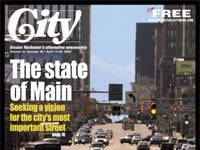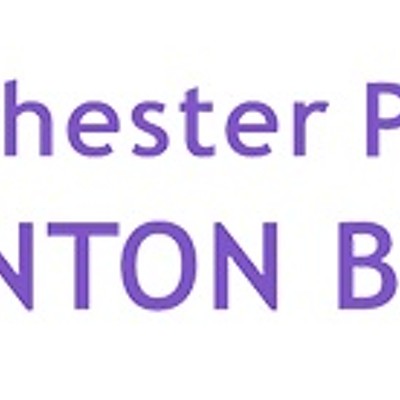[
{
"name": "500x250 Ad",
"insertPoint": "5",
"component": "15667920",
"parentWrapperClass": "",
"requiredCountToDisplay": "1"
}
]
During a recent "Tuesday Topics" talk at the Central Library, Rochester Police Chief Robert Duffy laid out the causes of urban homicide. "Look into our homes," he said, referring to family relationships or the lack of them. "It all starts there."
Yet the day before Duffy spoke, a hefty document packed with data and lofty abstractions delivered the opposite message --- that it all begins, and maybe ends, in Washington.
The document was George W. Bush's $2.4 trillion federal budget proposal for FY 2005.
If passed, this budget is bound to hit communities like Rochester hard, even as they reel from state and local budget cuts and fiscal missteps. In its approach to key areas like housing, schools, the environment, and security, the budget would surely do no good for unemployment, poverty and crime.
The Bush budget made headlines for some things it contains --- or lacks. For example, it's been widely reported that Bush wants to keep the overall growth in spending to less than one percent. This is well below the rate of inflation, so you might see the budget as a wide array of program cuts.
Then there are deficits: Bush figures the shortfall for FY 2004 will be $521 billion, the largest ever in nominal dollars and the latest in a possibly endless series. (Deficits aren't fatal if incurred for a good reason. But this one, says the Center on Budget and Policy Priorities, will come largely from tax-cut-driven revenue losses. And the latter could snowball in coming years.)
Some budget lines would fare much better than others. Certain education and health programs, for example, would get more than the average hike. Other programs would be zeroed out or get lumped in with other lines.
Two program areas are in a special class, however, not only for the rate of increase but for the actual amount of money involved. Homeland Security will get around 10 percent more. The Pentagon will get $402 billion total, around 7 percent more than last year's "enacted level." (If this request goes through, the Pentagon will have received a cumulative hike of 35 percent since FY 2001, the White House boasts.) This does not include spending for the military occupation and reconstruction of Iraq and Afghanistan, fiscal quagmires that will cost tens of billions in the next "off-budget" request alone.
Communities and interest groups across the country are slowly coming to terms with what the proposal will mean on their turf. For the nation's cities, things don't look too rosy.
The US Conference of Mayors was among the first to react to the Bush budget. Representing the nation's 1,183 cities with populations of 30,000 or more, the group issued a detailed staff analysis as well as a general statement. USCM director Tom Cochran said the group is "disappointed... and very concerned" about some items in the budget. He highlighted an 80 percent cut to COPS (Community Oriented Policing) and the elimination of the Local Law Enforcement Block Grant program.
Cochran mildly praised the White House for proposing increases to some home-ownership programs. But he deplored a planned $300 million cut in Community Development Block Grants and the complete axing of $25 million for brownfields redevelopment --- two program areas that are vital for older cities.
Also, Cochran worried about proposed Amtrak cuts --- down 26 percent, to $900 million. Such a cut, he said, would only help urban America's "crumbling and congested transportation infrastructure" deteriorate further.
The White House did offer a deal on this last item, though, according to the Conference of Mayors. If Congress agrees to adopt certain "reforms" --- basically, if lawmakers fall for carving up Amtrak's corporate functions and rail corridors --- the administration will support a $500 million boost in funding for intercity passenger rail.
We polled some Rochester leaders on the Bush budget. Rochester Mayor Bill Johnson and Action for a Better Community director James Norman both responded through aides that they couldn't comment yet.
Urban League president/CEO Bill Clark said he's aware of how "slight increases" mask the reality of budget cuts. "More funding is needed" for employment programs and other things that impact youth, he says. "You can tell young people to get off the street, but you have to give them an alternative."
Julie Everitt is director of development at Housing Opportunities Inc., which operates around 400 low-income rental units, most of them in the city. She voices concern about a proposed cut to "Section 8" housing assistance. (Indeed, this rent-assistance program for the nations' poorest families faces a $1 billion cut next year, says the Children's Defense Fund.)
Says Everitt: "When people have entry-level jobs, it's harder and harder to purchase housing. They need more Section 8 money rather than less." She adds that more than half of HOP's clients have seen their incomes decreasing in recent years.
Housing Council executive director Anne Peterson echoes some of Everitt's comments. "I notice that Community Development Block Grant funding went down," she says. "I think we need more, not less, to work with."
She worries about the effects on all of this region's "entitlement communities" --- strapped municipalities, large and small. "The city [of Rochester] certainly needs more... I think it's going to be a very lean year all around," she says. "Looking at the HUD budget, there's enormous emphasis on home ownership; I wish there were more on rental issues."
Monroe County School Boards Association director Jody Siegle says she's "freshly back from Washington" after attending a briefing on federal assistance to schools and school-lunch programs. For one thing, she's disappointed that sufficient funds aren't coming from Washington to implement the No Child Left Behind Act.
The Act, says Siegle, imposes "huge reporting requirements" with big staff costs. Moreover, she says, the federal government sometimes authorizes funds but fails to deliver. This year, she says, the actual cash in the pipeline is $6.2 billion short of the $18 billion promised. "Schools have to deal with 100 percent of the mandates, but the money has not followed the [provisions of the] bill," she says. "That all falls on local taxpayers."
Only "1.8 cents of every federal dollar goes to education," says Siegle. In practically every other country, she says, education is a function of the national government. She says the American system of local-and-state control has special strengths --- it "gives everyone the opportunity to pursue their path," for example.
We're in a "time of change" right now, says Siegle. There's more federal "intrusion" than before, she says, but the federal commitment to support the schools hasn't caught up.
As a budget battle looms in Washington, New York State and many of its subdivisions face yet another horrendous budget year. The Rochester City School District is peering into the abyss again.
But here, too, change is in the air. Following recent court decisions, the Downstate-based Campaign for Fiscal Equity and its allies are closer to realizing their dream of winning more resources for urban schools. Shortly after the Bush budget came out, the CFE said New York State would need around $7 billion more --- or at least a partial down payment on this amount in the near term --- to meet its constitutional obligations.
Many are asking, where will such an amount come from? At this point nobody seems to know. Least of all in the White House.
Speaking of Federal Budget, George W. Bush
-
Reader feedback - 3.22.06
Mar 22, 2006 -
The XX Files - 1.11.06
Jan 11, 2006 -
XX Files - 12.14.05
Dec 14, 2005 - More »
Latest in News
More by Jack Bradigan Spula
-

The state of Main
Apr 14, 2004 -
School improvement: the price is wrought
Apr 7, 2004 -
Hour of power
Mar 31, 2004 - More »






